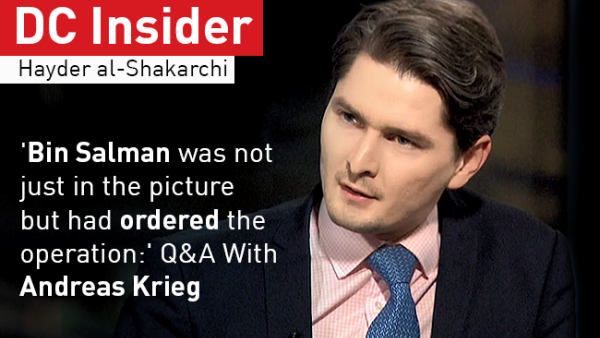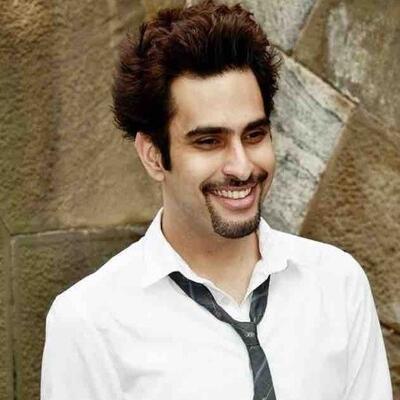Interview by Hayder al-Shakarchi
The following interview is part of a series published by Al Bawaba News, exploring the viewpoints, convictions, partisanship and consensus that exists in Washington D.C. around Middle East issues.
This author of this series will speak to analysts, policymakers and experts in their own words. Our aim is to provide a sense of the discussions and insider dialogue taking place in the world's most powerful capital. This does not in any way imply an editorial edorsement of the individuals or policy proposols put forward.
At times the framing of events and geopolitics found in the DC Insider Q&A format will be debunked or qualified by members of our editorial team in separate sections of the website.
Al Bawaba is indepenent and does not align with any existing political party or ideological group.
Hayder al-Shakarchi is an Arab-American journalist and an international news analyst based in Washington, D.C.
***
***
*This interview was conducted on 15 November 2018.
Al-Shakarchi: Why do you believe that MBS or KSA are not being held accountable by the U.S. for Khashoggi’s assassination?
Krieg: “There are obviously some economic interests that the U.S. have in Saudi Arabia. Saudi Arabia is the most important pillar for U.S. policy and strategy in the Middle East, so you can’t really get rid of Saudi Arabia… The Trump administration doesn’t really have that choice. They’re obviously in this partnership as the senior partner that has the leverage over the other but in the last couple of years, especially during the Obama years, we’ve seen a shift in that balance. The Saudis have increasingly more leverage than they used to; they’re able to speak back and they’re in a position of making demands on the U.S. because it’s no longer as invested in the region as it used to be.”
UPDATE (17 NOVEMBER 2018): The new evidence [that a recent Washington post story is built around] suggests that MbS was part of the operation and tried to lure Khashoggi back to Istanbul, knowing that a rendition or kidnapping would be easier there than in the U.S. This makes it clear that MbS was not just in the picture but had ordered the operation. Nothing in this kingdom happens without him. The story of rogue elements is completely fabricated.
Everyone who knows the current system knows that MbS must have ordered the operation. It was overseen by MbS’ best friend, Saud al-Qahtani. However, this new update doesn't prove that MbS ordered the killing... I still think that the story of a 'rendition gone wrong’ holds. It doesn't make it any better but looking at the history of Saudi kidnappings and renditions in the past, the Khashoggi case was meant to be a rendition. MbS wanted him removed and ordered him to be flown back to the kingdom. Like they did with prince Sultan bin Turki in Geneva a few years ago, they would have intoxicated him and flown him unconscious to Saudi Arabia where he would have disappeared. I am still not convinced that MbS wanted Khashoggi murdered in Istanbul. After a rendition to the kingdom, it would have been easier to do it there.
Al-Shakarchi: MBS stated that “Khashoggi’s murder was a terrible mistake.” This sounds like a confession, does it not?
Krieg: “They haven’t gone as far as to say that this was a pre-meditated murder, but they’re getting closer and closer to the official story that the Turkish government has tried to disseminate since early October. There already is a confession saying that, ‘Yes, Saudi Arabia was a part of it… They killed their own citizen.’
However, they’re saying that it was rogue elements within the government. The problem with attribution in these kinds of cases is that you need to establish a relationship between someone making an order (someone in the circle, someone like MbS himself or someone in his direct vicinity) and what actually happened in the consulate in Istanbul… That’s almost impossible to do because even with the recording that there is and has been disseminated, it doesn’t really incriminate MbS directly, it incriminates someone in Riyadh.
Thus, it’s quite clear that it’s someone in the direct vicinity of MbS and might very well be Saud al-Qahtani, who isn’t just an advisor to MbS but a best friend that was promoted to that position by MbS because they were buddies beforehand. He’s been playing a very instrumental role in the lock-up of a range of different Saudi citizens, especially the VIPs who were part of the Ritz-Carlton affair last year. To believe that someone like Qahtani would go rogue without any authority or permission from MbS is highly doubtful.”
Al-Shakarchi: First, it was a scuffle. Now, it’s lethal injection. Is this so that the parties involved in the assassination have more time to cover it up and align their stories?
Krieg: “Yes, and I think that the Trump administration was very much involved in that; trying to buy time. When it happened, the first thing that the Saudis thought was that it would go away on its own because they never thought that there would be enough evidence to bring anything credible to the prosecution.
Then, it turned out the Turks had more material than they thought and were willing to release it and so they had to come up with a different story. What they wanted was for it all to go away and so the Saudis came up with all sorts of explanations and said, ‘this is the story. Stick with it. End of discussion. MbS has nothing to do with it.’ They just want all of this to go away… If you look at the U.S. press, Washington in particular, this is a story that hasn’t really gone away for a month. The reputational costs for Saudi Arabia are huge; they’re enormous in comparison to all the other affairs that Saudi Arabia has or has not been involved in in over decades, so this is a very difficult situation for Saudi Arabia to be in.
The problem is that while they want it to go away, they still need time to create a story that ultimately has no holes in it because until now, any story, including the prosecutor’s version on Thursday, still has holes in it…. There are still unanswered questions. I think that the Turkish government will continue to put pressure until they think that those who were behind it, including Qahtani, are actually held responsible for it.
The Saudis thought it would be sufficient enough to fire Qahthani, but it turns out that might not be enough because he’s still around, he’s still on Twitter, he’s still tweeting, and he still has an advising role (just not the same one.) I think that a strong statement from the Saudis would be to firstly say that he’s the one responsible for orchestrating it and secondly, to put him on trial and give him a severe punishment that goes beyond just paying a fine… Give him a capital punishment. They are throwing five people under the bus, they might as well throw him under the bus. Anything below that, I don’t think the Turkish government will be willing to accept as senior responsibility.”
Al-Shakarchi: Where are the infamous recordings? Why haven’t we heard them, if just to know that they exist?
Krieg: “I’ve spoken to some people who have heard the tape from different countries (some European countries, some Middle Eastern countries) and they all seem to tell the same story of what’s on the tape. The problem with the tape is the question of: Where is the tape coming from? The Saudi consulate in Turkey is protected under the Vienna Convention and so it would have been illegal for the Turks to have bugged it, which begs the question: How did they get the information?
Obviously, they must have had some sort of bugs in the consulate to have made that recording so it’s semi-legal and I’m not sure you could use in court… I think this is something that the Turks will hold in their backhand until they really need to use it. For the time being, the story is still going on, people are still talking about, and there seems to be progress being made. The Turks have achieved quite a lot because the Saudis have somewhat given in to their initial version of the story; the story that the Saudis are coming out with is becoming increasingly more aligned with the story that the Turks have. Should they make a U-turn now and not continue with the prosecution in an attempt to buy more time in hopes that it’ll go away, the Turks may go ahead and release it to the public. However, at this point, there’s no use of doing it.”
Al-Shakarchi: When exactly would Turkey need to use this recording?
Krieg: “It’s their last resort... This is the last thing that they can use because they don’t have another ace up their sleeve. If they play their card now, then they’ll have nothing else. Eventually, like with any other news story, this story is going to go away. People in the U.K are talking about Brexit, there’s Donald Trump in the U.S. who constantly produces news stories, so eventually this story will die down more than it already has in comparison to where it was four weeks ago. And so if the Turks play their card now, they will lose their entire momentum which they might need two, three, four weeks down the line when it could really come in handy to break the news cycle again. At the moment, there really isn’t any benefit in doing it and that’s why they aren’t doing it.”
Al-Shakarchi: With KSA or MBS not being held accountable for Khashoggi’s assassination by the U.S., won’t this give them the chance to do it again, knowing that they can get away with it?
Krieg: “They don’t care about public opinion globally, they care more about what their partners might potentially think about them (Western partners- Europe and the U.S.) I think that the reputation damage there is quite severe… They know that they’re definitely being watched and that they don’t really have a choice but to follow that pressure and give into that pressure. It seems like the West has come to terms with the fact that, ‘The Saudis have done it. MbS might or might not have anything to do with it but we need him because if he’s removed, the entire system in Saudi Arabia might disintegrate because there’s no alternative to him. We have to find a way to keep him in power but demonstrate that we’re doing something about it…’ I think that this is exactly what’s going on at the moment.
I think the West is saying, ‘Okay, as long as the Saudis are taking action and as long as the Saudis know that something like this may never happen again, then we’re fine with it.”
Al-Shakarchi: Do you believe that Khashoggi’s sons were summoned to MbS by force?
Krieg: “Until the Khashoggi affair, a lot of young Saudis were cheering for MbS and a lot of these young people (I have a lot of Saudi students) are now actually questioning MbS. The entire cloak, him being the nice young chap who’s doing exactly what the youth in Saudi Arabia is yearning for, has disappeared.
I think that this was also the case with the the sons of Jamal… They’ve realized that this regime is not just unfair nor authoritarian but would go as far as to kill people that they consider to be a threat. I think that’s a gamechanger. Forcing is such a harsh word, but there are different coercive ways of how the Saudis get the kinds of images that they need, and this was an image that they wanted to have. They wanted to have an image of the crown prince and the sons to show that MbS is good with the family and that nothing bad is happening... There was definitely some coercion involved.”
***
Andreas Krieg is an assistant professor at the School of Security at King's College London specializing on Gulf security and violent non-state actors in the Middle East. He edited the forthcoming monograph 'Divided Gulf - the Anatomy of a Crisis'.









